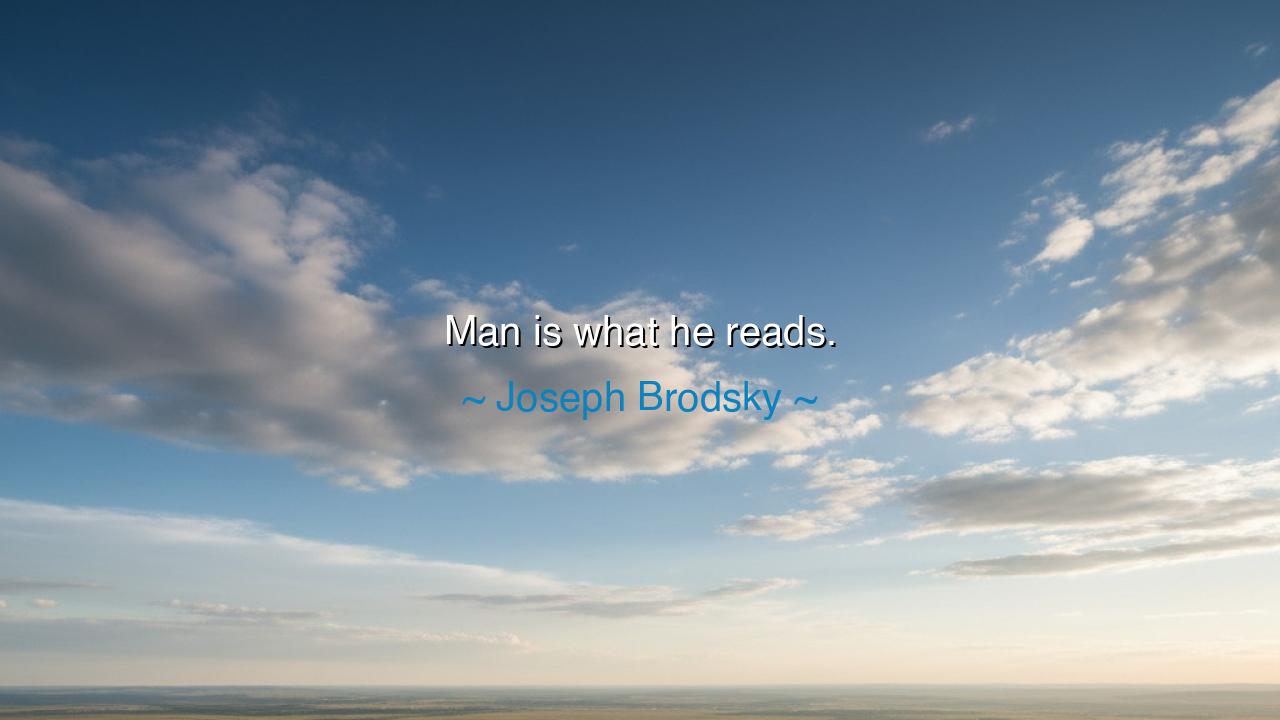
Man is what he reads.






Joseph Brodsky, poet of exile and prophet of the human soul, once declared: “Man is what he reads.” In these words lies a truth as ancient as letters themselves: that the mind is shaped by the food it consumes, and the heart by the stories it treasures. Just as the body grows from the bread it eats, so the soul is nourished—or corrupted—by the writings it takes in. To read is never neutral; it is a communion, a shaping, a silent apprenticeship to voices of the past and present. Thus, Brodsky’s statement is not casual—it is a warning, and a call to responsibility.
The ancients themselves proclaimed this wisdom. Plato spoke of the power of poetry and story to mold the young, urging that the wrong tales corrupt, while noble ones uplift. The Hebrews taught that “as a man thinketh in his heart, so is he,” linking thought to identity. And in Rome, Cicero declared that to study literature was to prepare the soul for virtue. Brodsky, exiled by tyranny yet saved by books, understood that what we read is what we become, for words are not mere ink—they are seeds that sprout into character.
Consider the story of Frederick Douglass. Born into slavery, he was forbidden to learn letters. Yet he fought for scraps of literacy, teaching himself to read by watching white children and studying discarded newspapers. The writings he absorbed transformed him; from them he drew the fire of freedom, the strength to escape bondage, and the eloquence to thunder against slavery itself. Douglass became what he read: a man of vision, courage, and unstoppable truth. Without books, he might have remained in chains; with them, he became a liberator.
But the opposite is also true: to read falsehood and corruption is to become false and corrupt. History bears witness in the Nazi regime, where propaganda books, filled with lies and hatred, deformed a generation into cruelty. Here we see Brodsky’s warning fulfilled—man is what he reads, and when men drink poison, they themselves become poisonous. Thus, the responsibility of reading is immense, for the chosen words echo in the heart, shaping destiny for good or evil.
The meaning of Brodsky’s words is therefore both noble and sobering. If we are what we read, then every book is a chisel carving the soul, every story a teacher whispering into the mind. To choose shallow or destructive works is to build a shallow or destructive self. To choose the noble, the wise, and the beautiful is to build a spirit that shines. Reading is not entertainment alone—it is identity, it is formation, it is the crafting of who we are and who we will become.
The lesson, then, is clear: guard your reading as you would guard your very life. Ask yourself: Does this book make me wiser, kinder, braver? Does it feed my soul or drain it? Fill your mind with the words of those who struggled for truth, who sang of beauty, who spoke with integrity. Read not only to pass the time, but to transform the time within you into eternity.
Practical action flows from this teaching. Make a habit of choosing books that challenge and uplift. Balance pleasure with depth, and do not fear to wrestle with hard truths written by the wise. Let every page you turn be a step toward becoming the person you were meant to be. And remember always Brodsky’s counsel: man is what he reads. Choose well, and your soul will grow strong; choose poorly, and you will diminish yourself. The power is in your hands, and the words you take in will echo forever in who you are.






AAdministratorAdministrator
Welcome, honored guests. Please leave a comment, we will respond soon